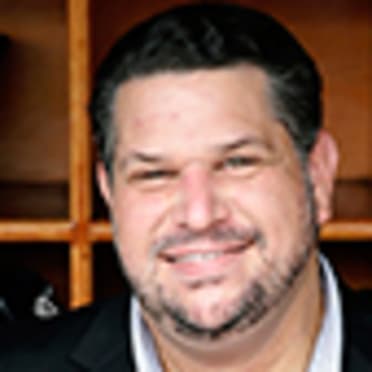Crowd noise affects no-hit bid: 'It is so loud'
Rosario, Swanson avoid collision on softly hit single in 8th inning
The Braves have enjoyed a tremendous home-field advantage at Truist Park this postseason, but during their 2-0 victory over the Astros in Game 3 of the World Series on Friday night, the energetic home crowd might have cost Atlanta a shot at history.
After three Braves pitchers had combined for seven innings of no-hit ball, Eddie Rosario couldn’t come up with a catch on Aledmys Díaz’s shallow fly ball to left field in the eighth, watching it fall a few feet in front of him to end the historic bid.
Both Rosario and shortstop Dansby Swanson were trying to close in on the ball, but the crowd noise prevented them from communicating on the play.
“I started charging it hard right away, and I noticed Dansby was charging hard as well -- and he had his back to the ball,” Rosario said through an interpreter. “Obviously, we're both trying to make a play on the ball. When I knew I had a bead on it, I was trying to say, ‘I got it, I got it.’ I knew Dansby couldn't hear me, so at the last minute, knowing we couldn't communicate, I wanted to make sure I avoided any collision between the two of us, so I just kind of eased up on it right there.”
Pinch-hitting for Martín Maldonado to lead off the eighth, Díaz did not hit the ball particularly hard. It left the bat at a relatively low exit velocity of 70.7 mph. But it hung in the air for nearly five seconds, giving Rosario ample time to chase it down; according to Statcast, the ball had an 85% catch probability.
Braves manager Brian Snitker was sitting back in the dugout, so while he didn’t have a great view of the play, he thought the crowd noise definitely played a role.
“To the players' credit, it is so loud and it's hard to hear,” Snitker said. “That's one of those plays where you practice -- if you've got someone that can work the pitching machine really good and do that play -- when we do popup priorities in Spring Training. That's a big play that we do so we don't have wrecks and guys take command of that. But in these circumstances, anything can happen because guys can't hear each other.”
The ball dinked in for a single to erase the no-hitter, but the Braves had bigger things on their minds. Clinging to a one-run lead, the Astros had put the potential tying run on base, with Jose Altuve lurking just two batters away.
“I didn't care about a no-hitter,” Snitker said. “I just care about the tying run getting on. It happens. It's a tough play right there.”
Tyler Matzek struck out pinch-hitter Jason Castro, then Altuve popped out to third baseman Austin Riley in foul territory. Jose Siri, who pinch-ran for Díaz, stole second base to move into scoring position, advancing to third on a throwing error by catcher Travis d’Arnaud. Any disappointment about losing the no-hitter had been replaced by a far more urgent thought -- holding the lead.
“Being such a close game in the postseason, you switch immediately to how can we keep that guy where he is and get out of the inning?” said Ian Anderson, who started Game 3 with five no-hit innings.
Michael Brantley followed with another popup to Riley, stranding Siri at third base to preserve the 1-0 advantage.
“The no-hitter is cool and all, but what it comes down to is we want to win the game,” Matzek said. “That's what it's all about.”
Rosario has been an offense-first player for most of his career, posting negative outs above average figures in each of the past three seasons. His defensive low came in 2019, when he had a minus-18 OAA, though that season proved to be an outlier: He was minus-2 in '20 and minus-1 in '21.
In the end, Rosario’s decision not to go all-out for the ball cost the Braves a shot at history, but they walked out of Truist Park with a 2-1 lead in the best-of-seven Series.
“The goal of every game is to get a win,” d’Arnaud said. “I think a no-hitter would have been a bonus, but when they got that hit, that wasn't our goal when the game started. It was just to go out there, execute pitches, get outs, and end with a win. That's ultimately what we did.”
